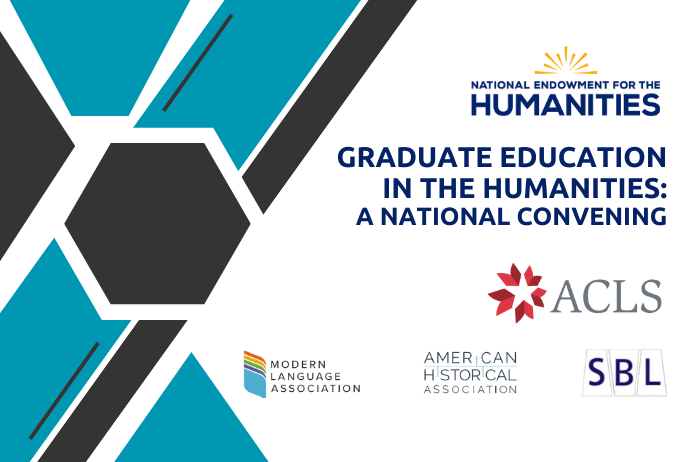ACLS to Commence Historic Collaboration with the National Endowment for the Humanities, “Graduate Education in the Humanities: A National Convening”

The American Council of Learned Societies (ACLS) has won the open competition for a cooperative agreement with the National Endowment for the Humanities (NEH) Office of Challenge Programs to lead the “Graduate Education in the Humanities: A National Convening” initiative. The NEH will provide up to $500,000 in funds to be matched by non-government third parties for a total of $1 million for this project.
ACLS and the NEH will undertake this ambitious effort at reform of graduate education together with the American Historical Association, the Modern Language Association, and the Society of Biblical Literature. At a time when many graduate programs in the humanities are experiencing cuts and reductions, this project aims to bring concrete solutions straight to faculty and administrators across the country. From 2025 to 2028, ACLS will engage decision-makers in commitments to adopt the recommended reforms and implement change.
The goal is system-wide improvement of the graduate education experience in the humanities for all students, including first generation college graduates and those from traditionally underrepresented groups. ACLS and the NEH also seek to promote the value of graduate education in the humanities to public audiences across the United States.
“Our mantra is carpe diem, ‘seize the day.’ We seek to transform a highly uncertain moment when humanities degree programs and budgets are being cut and the value of humanistic knowledge is being publicly attacked, into an opportunity for scholars to work together to improve graduate programs across the country,” said ACLS President Joy Connolly. “Together with the NEH, AHA, MLA, and SBL, we will tackle a range of enormously challenging issues, from financial aid and recruitment to degree requirements and professional outcomes. We want brilliant, dedicated, creative people to feel that graduate school in the humanities is the place for them and that their work will make a difference. We will build on successful reforms to model programs of study that are rigorous and responsive to students’ needs. And with the formal national Convening in 2027, we seek to make the strongest possible case for the benefits of graduate education in the humanities to the American public.”
Currently, graduate education in the United States takes place in a competitive, hierarchical landscape of institutions and organizations. With “Graduate Education in the Humanities,” ACLS will bring together stakeholders that traditionally do not work together—nearly 100 professional academic associations; administrators from the 45 institutions producing the vast majority of humanities PhDs in America (the ACLS Research University Consortium); more than 200 liberal arts, community college, regional comprehensive institutions, and research libraries (the ACLS Associate members); national associations such as the American Academy of Arts and Sciences and the Council of Graduate Schools; and thousands of scholars, including students, tenured, tenure-track, and adjunct faculty, and independent researchers, who have received ACLS fellowships and grants, served as peer reviewers, and participated in ACLS programs promoting new approaches to graduate curricula, the dissertation, and PhD career pathways.
ACLS is uniquely positioned to work with the NEH on this unprecedented project of national scope and scale. Each year, ACLS administers the award and distribution of $25 million in fellowships and grants to scholars at all career stages representing a broad variety of institutions. As part of its mission to advance the creation and distribution of knowledge in the humanities and social sciences, ACLS regularly convenes its 81-member academic societies, administrators from leading PhD programs, and students and scholars at the forefront of 21st century research in a broad range of established and emerging fields. Programs like the Mellon/ACLS Public Fellows (2011-2020), ACLS Leading Edge Fellowship (2020-present), and the Mellon/ACLS Dissertation Innovation Fellowship demonstrate the ACLS commitment to graduate education reform and to better prepare humanities PhDs to use their knowledge and skills as a public good.
Learn more about ACLS resources that reflect innovative approaches to humanities education, including reports and resource pages on publicly engaged doctoral education; diverse PhD career pathways; improving diversity, equity, and belonging, alternatives to traditional forms of the dissertation; and innovations in research training and methods.
Created in 1965 as an independent federal agency, the National Endowment for the Humanities supports research and learning in history, literature, philosophy, and other areas of the humanities by funding selected, peer-reviewed proposals from around the nation. Additional information about the National Endowment for the Humanities and its grant programs is available at www.neh.gov.

